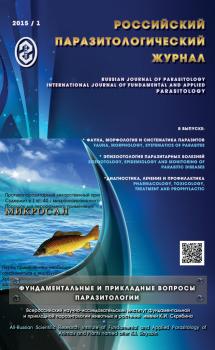На системах картофель — Globodera rostochiensis и томаты — Meloidogyne incognita показано, что обработка семян томатов и клубней картофеля перед посадкой биогенными индукторами (хитозаном, жасмоновой и салициловой кислотами по отдельности и в сочетании с хитозаном) индуцирует системную устойчивость (СИУ) восприимчивых растений и популяция нематод на растениях, обработанных этими препаратами в определенных концентрациях, проявляла признаки морфо-физиологического угнетения. Показано, что механизм действия СИУ связан с изменением тех же защитных механизмов, которые отмечены при естественном иммунитете растений к нематодам. Применение для повышения устойчивости растений исследованных биогенных индукторов удовлетворяет требованиям нового поколения препаратов для защиты растений и их использование может быть перспективным.
нематоды, системная индуцированная устойчивость, хитозан, салициловой кислота, жасмоновая кислота.
Introduced
Plants are often exposed to biotic stresses derived from viruses, bacteria, fungi, nematodes, and insects that can endanger crop yields and cause relevant economic losses.
Plant-parasitic nematodes are pests of a wide range of economically important crops, causing severe losses to agriculture, incurring estimated economic losses in excess of €100 billion/year in worldwide. Sedentary cyst and root knot nematodes are obligatory parasites of a wide range of crops. Sedentary nematodes which cause characteristic formations on roots, galls or root-knots, and cyst-forming ones which females transform into cysts at the last stage of their life cycle, have been of great economic importance and a subject for intent studies of nematologists and phytopathologists worldwide. These sedentary endoparasites start a lasting relationship with their host plant; the nematodes force the plant to create an exclusive feeding site located in the plant root. For growth and development, the nematode fully depends on this food source.
Potato cyst nematode (PCN) Globodera rostochiensis is classified with the most dangerous and economically significant pathogens of the family Solanaceae. This nematode decreases the yield of potato (to 60%), worsens the quality and marketable condition of tubers, as well as enables potato infection with other diseases. PCN is a sedentary endoparasite of potato roots, fighting with which is hampered due to the good adaptation of the parasite to environmental conditions, long (10 to 15 years) lifespan of cysts in the absence of the host plant, and the threat of occurrence of aggressive pathotypes in the case of reduction of nematode-resistant potato varieties in a monoculture.
1. Avdyushko S.A., Bezzubov A.A., Chalova L.I., Ozertskovskaya O.L. Definition of phytoaleksins potato rishitin and lûbimin using gas-liquid chromatography. New techniques of practical biochemistry. - Moscow: Nauka, 1988, S. 156-159 (in Russian)
2. Tarchevskii I.A. Signal’nye sistemy kletok rastenii (Signaling Systems of Plant Cells). - Moscow: Nauka, 2002, 294 p. (in Russian)
3. Durrant W.E., Dong X. Systemic acquired resistance. Annu. Rev. Phytopath. 2004, Vol. 42, p.185-209.
4. Erlanger B.F., Kokowsky N., Cohen W. The preparation and properties of two new chromogenic substrates of trypsin. // Arch. Biochem. Biophys. - 1961, Vol. 95, p. 271-278.
5. Gerasimova N.G., Pridvorova S. M., Ozeretskovskaya O. L. Role of phenylalanine ammonia lyase in the induced resistance and susceptibility of potato plants. // Appl. Biochem. Microbiol. - 2005, Vol. 41, p.103-105.
6. Il’inskaya L.I., Gerasimova N.A., Perekhod E.A. et al., Lipoxygenase activity in plants with induced resistance to diseases. // Russ. J. Plant Physiol. - 2000, Vol. 47, p. 449-455.
7. Muzzarelli R., Rocchetii R. Chitin in Nature and Technology. - New York: Plenum, 1986, p. 385-386.
8. Ozeretskovskaya O.L., Vasyukova N.I., Gerasimova N.A. Potato Resistance Induced by Chitosan Derivatives. // Doklady Biological Sciences. - 2009, Vol. 427. p. 355-357.
9. Shibuya N., Kaku H., Kuchitsu K. et.al. Localization and binding characteristics of a high-affinity binding site for N-acetylchito-oligosaccharide elicitor in the plasma membrane from suspension-cultured rice cells suggest a role as a receptor for the elicitor signal at the cell surface. // Plant Cell Physiol. - 1996, Vol. 37, p. 894-898.
10. Udalova Zh.V., Revina T.A., Gerasimova N.G., Zinovieva S.V. Participation of Proteinase Inhibitors in Protection of Tomato Plants against Root-Knot Nematodes. // Doklady Biological Sciences. - Vol. 458, No 6, p. 726-729 DOI:https://doi.org/10.12737/23https://doi.org/10.1134/S0012496614050147
11. Vasyukova N.I., Il’inskaya L.I., Perekhod E.A. et al. Modulation of plant resistance to diseases by water-soluble chitosan. // Applied Biochemistry and Microbiology. - 2001, Vol. 37, p. 103-109.
12. Zinoviva S.V. Co-daptation mechanisms in plant - nematode systems. // Parasitology. - 2014, Vol. 48, p.110-130.
13. Zinovieva S.V., Chalova L.I. Phytoalexins of potato and their role in the resistance to stem nematodes // Helminthologia. - 1987, V. 24, p. 303-309.
14. Zinovieva S.V., Ozeretskovskaya O.L., Iliinskaya L.I. et al. Biogenic elicitor (arachidonic acid) induced resistance in tomato to Meloidogyne incognita. // Russ. J. Nematol. - 1995, Vol. 3, p. 65-67.
15. Zinovieva S.V., Vasyukova N. I., Ozeretskovskaya O.L. Involvement of plant sterols in the system tomatoes Meloidogyne incognita. // Helminthologia. - 1990, Vol. 27, p. 211-216.
16. Zinovieva S.V., Vasyukova N.I., Ozeretskovskaya O.L. Biochemical aspects of plant interactions with phytoparasitic nematodes: a review. // Applied Biochemistry and Microbiology. - 2004, Vol. 40. p. 111-119.
17. Zinovieva S.V., Vasyukova N.I., Udalova Zh.V. et al. Induction of systemic resistance of tomato to root-knot nematodes by biogenic elicitors. Induced resistance in plants against insects and diseases. // IOBCWPRS Bulletin. - 2012, Vol. 83, P. 281-284.
18. Zinovieva S.V., Vasyukova N.I., Udalova Zh.V., Gerasimova N.G. The participation of salicylic and jasmonic acids in genetic and induced resistance of tomato to Meloidogyne incognita (Kofoid and White, 1919). // Biology Bulletin. - 2013, Vol. 40, p. 297-303. DOI:https://doi.org/10.12737/23https://doi.org/10.1134/S1062359013030126/





